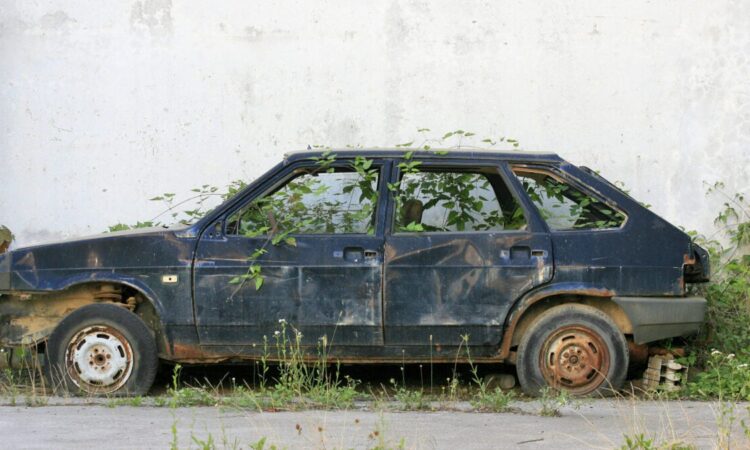
A jalopy car is a beat-up ride that you don’t want to be seen in. A truly junk car can’t be driven on the road and is only good for spare parts or scrap metal.
The good news is that you can still get cash, and remove a vexing eyesore, even if your clunker has taken its last gulp of gasoline. The key is to know its condition, which will determine whether you should sell, scrap or donate the rust bucket.
Junking a car: What does it mean?
Junking a car means you’re getting rid of a disaster on wheels, sometimes in exchange for some cash.
Cars that are legally considered junk have been damaged beyond repair: Think floods, fire and serious accidents. The vehicle is unsafe down to its metal bones — you can’t title it or register it ever again.
Therefore, you can sell the now useless car to a junkyard that will sell off the metal and any parts that are still operable.
Note that if you have a new car and it’s having serious problems, you may be protected by lemon car laws. Look up the lemon car laws for your state and reach out to your local consumer protection agency or state attorney general with any questions.
How to junk your car
Gather the paperwork
Be sure you can prove that you own the car and thus have the right to junk it. This is where the paperwork comes in.
- Proof of ownership: You need to prove you’re the current owner before you can take the money and run. Most states require you to sign over the car’s title.
- Release of lien: If the paperwork shows that there’s a loan on the car, you’ll likely need a form called “release of lien” saying that it’s been paid off. You usually can’t junk a car if it still has a loan on it.
- Odometer: You may need an odometer statement, which discloses the number of miles on the car.
Paperwork requirements vary by state. Look at your state’s department of motor vehicles website to double check that you’ve got everything. You can often download any needed forms. Always check if you’re required to get a notary before you sign anything.
Call a few junkyards
Junkyards and car recycling centers buy vehicles, find the components that still retain value (be it metal or parts) and sell them off.
Your unwanted car could provide much-needed parts for Americans looking to repair their vehicles, according to Sandy Blalock, executive director of the Automotive Recyclers Association.
“Auto recycling is making sure any good parts are recovered – making it much more cost effective to repair a vehicle,” said Blalock. “Once we’ve recovered all the parts, the vehicle is prepped to go to its end of life. We take the vehicle and crush it, recovering materials for the secondary metals industry.”
Call around to a few junkyards and see how much they’ll offer you. Depending on your location and the car, you could expect $100 to $500. With multiple quotes, you can take the highest and ask if they’ll throw in free towing.
Whatever you do, don’t abandon your vehicle. Besides not netting you any cash, the car’s liquids (oil, gas, antifreeze) are environmental hazards.
Prepare the car
You don’t need to scrub it or hose it down, but get all of your personal belongings out of the car. Be sure to check the backseat for anything your kids may have left behind.
Sign it over and cancel any insurance
Once you’ve shaken hands on the deal (metaphorically or literally), sign the paperwork and get that hunk of junk out of your life.
Drive it to its new owner or set up a pickup time for a tow truck. Don’t cancel your car insurance until the vehicle is officially out of your hands.
With the paperwork completed and the keys transferred, you’ve successfully junked your car.
Alternatives to junking your car
Consider a private party sale
If your car is drivable and reliable (or it’s an antique), you can likely get the most money for it by selling it to another person on a site like Facebook Marketplace or Craigslist.
Even if your car doesn’t run the best, people with more mechanical knowledge could fix it up themselves or use it for parts.
If you pick this option, keep in mind that you’ll have to fully disclose the car’s condition — we recommend that you’re upfront about any and all of the car’s problems.
Look into donating it
Major nonprofits, including the American Red Cross, accept car donations nationwide and will pick it up at no cost to you. They often accept vehicles in any condition as long as they have an engine, are in one piece and are accessible to a tow truck.
While you won’t get cash, you can receive a tax deduction and save time you’d otherwise spend trying to sell it.
“What the charity will do with the car influences what you can receive for your car,” said Judy Brown, a certified financial planner (CFP) at management consulting firm, SC&H Group. “Some charities keep the cars, some charities sell the cars. If kept, you can take the [Kelley Blue Book] value as a deduction. If it’s sold, you can receive the deduction of the sales price.”
However, a deduction really only makes sense if you itemize your tax deductions, rather than taking the standard deduction as nearly nine-in-10 filers do.






